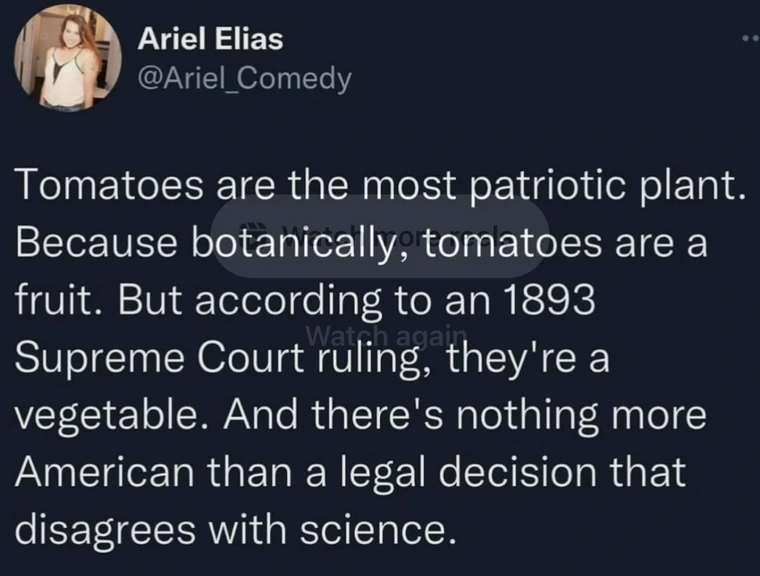Botanically is there such thing as a "vegetable"?
Microblog Memes
A place to share screenshots of Microblog posts, whether from Mastodon, tumblr, ~~Twitter~~ X, KBin, Threads or elsewhere.
Created as an evolution of White People Twitter and other tweet-capture subreddits.
Rules:
- Please put at least one word relevant to the post in the post title.
- Be nice.
- No advertising, brand promotion or guerilla marketing.
- Posters are encouraged to link to the toot or tweet etc in the description of posts.
Related communities:
Vegetables aren’t actually a thing though. Just a bunch of things we grouped because we like eating them.
There's no such thing as a fish
True. They are just water based government drones, to keep tabs on the mermaid population
If there's even a 1% chance Jason Momoa could go rouge we should treat it as an absolute certainty.
Yes there is. Taxonomists aren't the only people who give meaning to words
"Taxonomists aren't the only people who give meaning to words"
Eloquently put! You've expressed a feeling that I have had for a while now and couldn't quite put into the appropriate words! Thanks 🙏🏼
Ok. I'm a fish.
*within taxonomy, I think most people can conceive of a fish in colloquial terms.
Like fish.
"Fruit" within culinary is usually applied to "sweeter" forms of fruits, and the more savory forms usually get called "vegetable" instead regardless of being botanically called fruits or not.
Tomatoes are sweet
Nix v. Hedden, 149 U.S. 304 (1893), is a decision by the Supreme Court of the United States in which the Court unanimously held that tomatoes should be classified as vegetables rather than fruits for purposes of tariffs, imports and customs. Justice Horace Gray delivered the opinion of the Court in holding that the Tariff Act of 1883 used the ordinary meaning of the words "fruit" and "vegetable", instead of the technical botanical meaning.
https://en.wikipedia.org/wiki/Nix_v._Hedden
Yeah, I genuinely don't see the problem here. There are much weirder classifications with regards to tariffs. (Note that I haven't been able to fact check this, is could be a popular urban legend.) Converse shoes have a felt lining that makes them considered slippers instead of shoes. The practice is called tariff engineering. (That page lists the Converse thing, so maybe it's actually true.)
Stupid meme. Many other countries also classify tomatoes in with vegetables for various commerce regulation and taxation purposes. That case was just capitalists trying to get out of paying tariffs by nitpicking the definition of a tomato
I hate these things where people twist reality just so they can make a cute "Americans are so dumb" meme. If you want to bash the US, there are plenty of relevant topics to choose from for criticism. Better yet, read a book once in a while instead of just scrolling the internet and grabbing random shit that's gone viral.
And BTW, what's a fruit or vegetable is not some objective Sacred Truth that science "discovered", it's that science came up with a system of categorizing plants that people deemed to be useful for the study of Botany, just as legislators came up with a slightly different classification useful for taxation, and regular people also classify them in a way that's useful for cooking purposes. This is not a situation where Science! is an almighty God. It's just ways of sorting things. "Knowledge is knowing that a tomato is a fruit; wisdom is not putting it in a fruit salad."

This made me chuckle more than it should have
My stubborn position is that all fruits are vegetables.
Anything that comes from a plant (vegetation) is a vegetable.
EDIT: Reading up on the case, they apparently didn’t treat fruits and vegetables as disjoint sets but rather with fruits as a subset of vegetables. So far, so good…
HOWEVER, they also apparently ruled that tomatoes don’t count as a fruit because they aren’t eaten for dessert…
Wow… just… wow.
Fruit is a scientific term. Vegetable is a culinary term.
Fruit is also a culinary term that is not identical to its meaning as a scientific term
because they aren’t eaten for dessert
This sounds to me like a reasonable way to disqualify something as a culinary fruit.
Folks like to make a big hullabaloo about tomatoes being technically a fruit, but no one gives a second thought about referring to peppers, cucumbers, green beans, eggplant, avocado, pumpkins & other squash, or corn on-the-cob as vegetables even though they are all technically fruit.
And I was being picky there, because beans, peas, grains and nuts are all also technically fruit. Heck, lots of “nuts” like peanuts and cashews aren’t even really nuts.
Keep your taxonomy out of my kitchen:
- Fruit are sweet.
- Vegetables are not.
- Grains make bread.
- Herbs and spices add a lot of flavor with a little bit. Herbs are the green ones.
- nuts are. They just are. Don’t think about it too hard.
Because Fruits were taxed higher than vegetables, so importers started listing them as a vegetable.
It's tax dodges all the way down.
I just looked it up and it was actually the opposite: vegetables were taxed and fruits were not. Then somebody argued that they shouldn't have to pay and the court decided that yes, botanically speaking tomatoes are fruit, but in their ordinary meaning (which is used in commerce and trade) they are a vegetable. And that a tomato is used and prepared like a vegetable so it should be classified as that.
Just a list of items we normally think of as veggies, but actually fruit: cucumbers, squash, peppers, eggplants, avocados, pumpkins.
The real misconception is that people conflate culinary terms with biological terms.
Are actually fruit
No, they are culinary vegetables. They are also biological fruits. AFAIK "vegetable" does not even have meaning in biology
It doesn't matter why are you roleplaying as a botanist if you don't see that culinary definitions and scientific classification are two separate things. One is really useless for the average person and the other is probably also a foreign concept to everyone having quirky discussions about whether cakes are hotdogs or smoothies, because they are the type of people to tweet a 60 page essay about why expecting neurodivergents people to cook their own meal should be considered a hate crime.
Botanical vs culinary. Different contexts; different definition per context. There is not a problem here.
Plus they make the national drink...ketchup.
So is ketchup technically a jam?
Yes according to the Dutch.
Fruits are a subset of vegetables.
This leaves out the modern extension of this where pizza meets the requirements of a vegetable due to it containing 2 tablespoons of tomato paste as specified in the "Consolidated and Further Continuing Appropriations Act of 2012", previously the "Healthy, Hunger-Free Kids Act of 2010".
Thanks Obama
I'm officially calling this post misinformation. See the text of the opinion (emphasis mine). They literally say "Botanically speaking, tomatoes are the fruit of a vine". This is not about whether a tomato is a fruit or a vegetable according to specific botanical or common definitions, but about which definition to use for the purpose of the Tariff Act of 1883. It doesn't say that tomatoes are a vegetable. It doesn't say that botanically they aren't fruits. It says that for the purpose of the Tariff Act of 1883 they are vegetables, not fruits.
Nix v. Hedden, 149 U.S. 304 (1893)
[...]
MR. JUSTICE GRAY, after stating the facts in the foregoing language, delivered the opinion of the Court.
The single question in this case is whether tomatoes, considered as provisions, are to be classed as "vegetables" or as "fruit" within the meaning of the Tariff Act of 1883.
The only witnesses called at the trial testified that neither "vegetables" nor "fruit" had any special meaning in trade or commerce different from that given in the dictionaries, and that they had the same meaning in trade today that they had in March, 1883.
The passages cited from the dictionaries define the word "fruit" as the seed of plaints, or that part of plaints which contains the seed, and especially the juicy, pulpy products of certain plants covering and containing the seed. These definitions have no tendency to show that tomatoes are "fruit," as distinguished from "vegetables" in common speech or within the meaning of the tariff act.
There being no evidence that the words "fruit" and "vegetables" have acquired any special meaning in trade or commerce, they must receive their ordinary meaning. Of that meaning the court is bound to take judicial notice, as it does in regard to all words in our own tongue, and upon such a question dictionaries are admitted not as evidence, but only as aids to the memory and understanding of the court. Brown v. Piper, 91 U. S. 37, 91 U. S. 42; Jones v. United States, 137 U. S. 202, 137 U. S. 216; Nelson v. Cushing, 2 Cush. 519, 532-533; Page v. Fawcet, 1 Leon. 242; Taylor on Evidence (8th ed.), §§ 16, 21.
Botanically speaking, tomatoes are the fruit of a vine, just as are cucumbers, squashes, beans, and peas. But in the common language of the people, whether sellers or consumers of provisions, all these are vegetables which are grown in kitchen gardens, and which, whether eaten cooked or raw, are, like potatoes, carrots, parsnips, turnips, beets, cauliflower, cabbage, celery, and lettuce, usually served at dinner in, with, or after the soup, fish, or meats which constitute the principal part of the repast, and not, like fruits generally, as dessert.
The attempt to class tomatoes as fruit is not unlike a recent attempt to class beans as seeds, of which Mr. Justice Bradley, speaking for this Court, said:
"We do not see why they should be classified as seeds any more than walnuts should be so classified. Both are seeds, in the language of botany or natural history, but not in commerce nor in common parlance. On the other hand, in speaking generally of provisions, beans may well be included under the term 'vegetables.' As an article of food on our tables, whether baked or boiled, or forming the basis of soup, they are used as a vegetable, as well when ripe as when green. This is the principal use to which they are put. Beyond the common knowledge which we have on this subject, very little evidence is necessary or can be produced."
